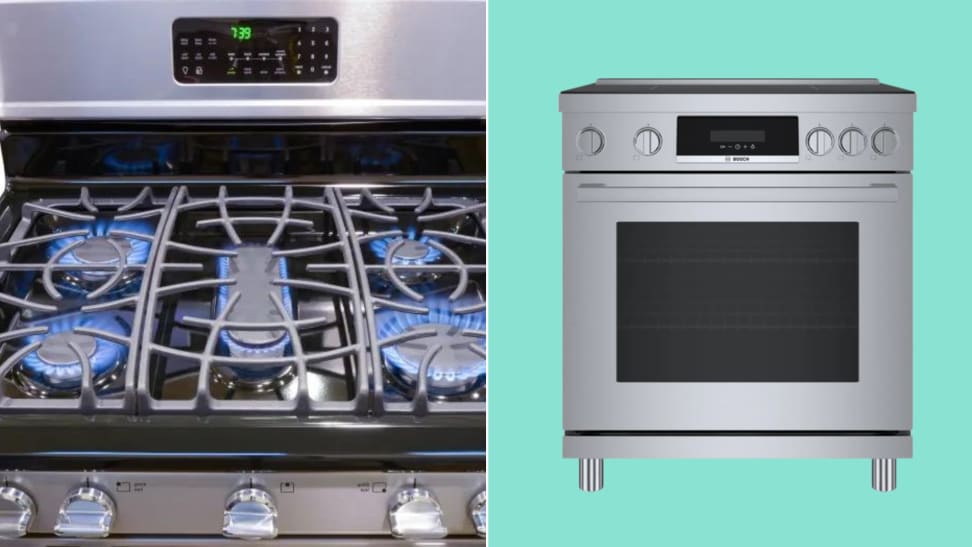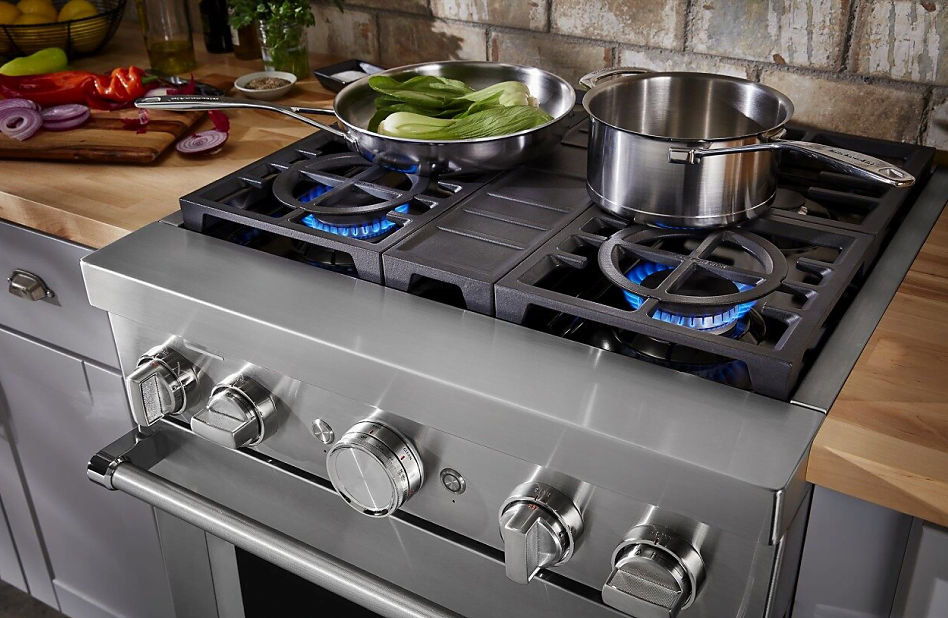Electric stoves generally cost less to operate than gas stoves. The best option depends on your specific cooking preferences and energy costs. Is electric stove cheaper than GAS? Which one is best. let’s explore the best one
Choosing between an electric and a gas stove can impact your energy bills and culinary experience. Electric stoves, recognized for their even heating and lower operating costs, draw power from your home’s electricity. These stoves are often preferred in regions where electricity is cheaper or more readily available.
In contrast, gas stoves offer precise temperature control and faster heating, a favorite feature among cooking enthusiasts. They require a natural gas line and are popular where gas is more cost-effective. Determining the ‘best’ ultimately hinges on factors such as local utility rates, kitchen infrastructure, and personal cooking style. Both types boast unique advantages, making it essential to weigh these against your individual needs and the cost of utility in your area.

Credit: www.whirlpool.com
Cost Comparison
When choosing between gas and electric stoves, costs play a crucial role. Many wonder, “Is an electric stove better than LPG?” or “Which is cheaper, a gas stove or an electric stove?” This section dives into the financial aspects of both, examining initial investments and operating costs.
Initial Investment
The upfront cost is the first step in our cost comparison. Gas stoves typically require a higher initial investment due to the need for a gas line installation. On the other hand, electric stoves often have a lower purchase price and can be plugged into any existing outlet. Here’s a brief overview:
| Stove Type | Average Initial Cost |
|---|---|
| Gas Stove | $650 – $2,000 |
| Electric Stove | $400 – $1,700 |
Operating Costs
Operating costs can greatly influence your decision. Some often ask, “Is it cheaper to use a gas or electric hob?” The answer depends on your local utility rates. Gas stoves generally use less energy, making them more cost-effective to operate. Still, electric stoves can be more efficient, and with the rise in eco-friendly electric rates, this gap might close.
- Gas Stoves: Lower per-unit energy costs, efficient for frequent cooking.
- Electric Stoves: Higher per-unit energy rates, but with advances in technology, may offer better energy use per cooking task.
Determining “Should I replace the gas stove with electric?” hinges on these costs. Evaluate your cooking habits, energy prices, and initial budget to make an informed decision.

Credit: reviewed.usatoday.com
Energy Efficiency
Energy Efficiency lies at the forefront of the debate between electric and gas stoves. Homeowners and chefs alike weigh these options, not just based on cooking preferences but also keeping an eye on their energy bills and environmental impact. Energy efficiency not only influences operational costs but also affects our carbon footprint. As such, understanding the efficiency of your cooking appliance is crucial.
Electric Stove Efficiency
Electric stoves are praised for their consistent heat distribution and precise temperature control. They convert almost all the electricity they consume into heat, with typical efficiencies hovering around 90%. This means very little energy is wasted. Yet one might ask: “Which is cheaper gas stove or electric stove?” The answer depends on your local electricity rates versus gas prices.
| Electric Stove Efficiency Factors |
|---|
| Heat distribution |
| Temperature control |
| Energy conversion rate |
| Cost of electricity |
Gas Stove Efficiency
Gas stoves, on the other hand, have a different efficiency story. They offer instant heat and cook food more quickly. However, only about 40% to 55% of the energy used by gas stoves goes directly into cooking, with the rest lost to the surrounding air. When pondering “Is electric stove better than LPG?” consider that gas stoves may lead to higher indoor air pollutants.
- Instant heat application
- Quick cooking times
- Lower energy utilization
- Indoor air quality considerations
If you’re asking “Should I replace a gas stove with an electric?” think about your cooking habits and energy prices. For a cost perspective, ask “Is it cheaper to use a gas or electric hob?” The answer often leans towards gas being cheaper, but electricity could be more efficient overall.
Cooking Performance
Discussing cooking performance brings the spotlight onto how different stoves manage during everyday use. While contemplating, “Which is cheaper gas stove or electric stove?“, it’s crucial to consider how they impact your culinary experience. Heat distribution and control greatly influence the outcome of your dishes.
Heat Distribution
The evenness of heat spread across your cookware marks a vital point in the electric vs. gas stove debate. An electric stove typically has a smooth surface that provides consistent and uniform heat. This means your entire pan receives the same amount of heat, which is great for cooking dishes that require even temperatures.
On the other hand, gas stoves offer heat that instantly wraps around the base of your cookware. This can result in hot spots, which require you to move the pan around for equal heat distribution. Chefs who rely on precision may ponder, “Is electric stove better than LPG?” when considering the importance of heat distribution in their cooking.
Control And Responsiveness
Adjusting the flame quickly bears significance for tasks like simmering or searing. With a gas stove, changes in temperature are immediate, allowing chefs to transition from a boisterous boil to a gentle simmer in seconds. For those wondering, “Should I replace gas stove with an electric?“, remember that responsiveness is a key benefit of gas cooking.
Electric stoves, while providing steady heat, often take longer to respond to temperature adjustments. This can be a drawback when a recipe demands quick changes. Individuals wanting to know, “Is it cheaper to use a gas or electric hob?” must also weigh the importance of control in cooking performance alongside the cost.
Safety Considerations
Safety considerations play a pivotal role in the debate of whether to choose an electric or gas stove. Issues such as potential gas leaks, flame control, and the risk of burns shape user preferences and concerns. Here, we delve into the specific safety aspects of both types of stoves.
Gas Stove Safety
- Flame Control: Gas stoves provide immediate heat adjustments, decreasing the risk of overcooked food or burnt pots.
- Leak Risks: Untended gas leaks pose a serious hazard. Install detectors and ensure regular maintenance for safety.
- Avoid Clutter: Keep the area clear of flammable materials to prevent fire incidents.
- Child Safety: Equip stoves with knob covers or safety devices to keep children from accidentally turning them on.
While gas stoves offer superior heat management, they come with concerns such as leaks. You might wonder, “Is electric stove better than LPG?” especially in the context of safety.
Electric Stove Safety
- No Open Flame: Without an open flame, electric stoves reduce the risk of fire from spills or flammable materials.
- Cooler Surfaces: Certain electric models, such as induction cooktops, stay cooler, offering a burn-free environment, especially for curious kids.
- Simplified Use: With fewer knobs and buttons, electric stoves present a straightforward operation, minimizing accidents.
- Automatic Shut-off: Some electric stoves feature timers and shut-off mechanisms for enhanced safety.
In the context of safety, replacing gas stoves with electric ones could reduce hazards significantly. “Should I replace gas stove with electric?” becomes a relevant question when safety is at stake. Not only are electric appliances potentially safer, but many also ask, “Is it cheaper to use a gas or electric hob?” or “Which is cheaper gas stove or electric stove?” While electric stoves tend to have a higher initial cost, safety and efficiency can make them more economically appealing in the long run.
Environmental Impact
When thinking about the environmental impact of stoves, we must consider how they affect our planet. Discussions often center around two questions: “Which is cheaper gas stove or electric stove?” and “Is electric stove better than LPG?” The answers are more complex than just looking at the price tags. We have to dig deeper into the carbon footprint and sustainability of each option.
Carbon Emissions
The discussion of carbon emissions is vital in understanding the environmental impact of both electric and gas stoves. A gas stove burns natural gas, releasing carbon dioxide directly into the atmosphere. However, the carbon footprint of an electric stove is not as straightforward. It depends on how the electricity is generated. If it comes from renewable sources, the emissions can be significantly lower. By asking, “Should I replace gas stove with electric?” you might also be inquiring about the potential for lower emissions.
Sustainability
When we explore sustainability, we’re looking at the long-term effects of our choices on the environment. Gas stoves rely on finite natural gas resources, which poses a sustainability issue. In contrast, electric stoves can run on renewable energy, making them more sustainable in the long run. The question, “Is it cheaper to use a gas or electric hob?” also entails weighing the cost of depleting resources against renewable options.
Regardless of the immediate costs, choosing the most sustainable option will benefit the environment over time. Elevating our understanding of these impacts allows for conscious decisions that align with eco-friendly living.

Credit: www.angi.com
Frequently Asked Questions Is electric stove cheaper than GAS? Which one is best…
Is It Cheaper To Cook With Gas Or Electric Stove?
Cooking with gas stoves is generally cheaper than electric, as natural gas tends to cost less than electricity per unit.
Do Home Buyers Prefer Gas Or Electric Stoves?
Home buyers’ preferences vary; some prefer gas stoves for their temperature control, and others opt for electric stoves for their sleek design and ease of cleaning. Preferences are often influenced by cooking habits and kitchen design.
Should I Replace Gas Stove With Electric?
Deciding to replace a gas stove with an electric one involves considering energy efficiency, kitchen safety, cooking preferences, and potential cost savings. Evaluate your priorities to make an informed decision.
What Are The Disadvantages Of Electric Stoves?
Electric stoves offer slower heat adjustment, creating less responsive cooking control. They require specific flat-bottomed cookware and typically incur higher energy costs. Electric stoves also present a difficult-to-clean surface and can be slow to heat up and cool down.
Conclusion
Deciding between an electric and gas stove involves various factors. Cost, cooking preferences, and energy efficiency all play a role. While electric stoves may offer cheaper upfront costs and consistent heat, gas stoves provide quick temperature control and lower operating expenses.
Choose what aligns with your needs for the ideal kitchen experience.










